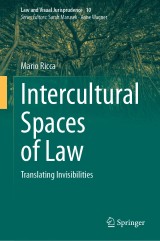Details

Intercultural Spaces of Law
Translating InvisibilitiesLaw and Visual Jurisprudence, Band 10
|
160,49 € |
|
| Verlag: | Springer |
| Format: | |
| Veröffentl.: | 03.04.2023 |
| ISBN/EAN: | 9783031274367 |
| Sprache: | englisch |
Dieses eBook enthält ein Wasserzeichen.
Beschreibungen
<p>This book proposes an interdisciplinary methodology for developing an intercultural use of law so as to include cultural differences and their protection within legal discourse; this is based on an analysis of the sensory grammar tacitly included in categorizations. This is achieved by combining the theoretical insights provided by legal theory, anthropology and semiotics with a reading of human rights as translational interfaces among the different cultural spaces in which people live. To support this use of human rights’ semantic and normative potential, a specific cultural-geographic view dubbed ‘legal chorology’ is employed. Its primary purpose is to show the extant continuity between categories and spaces of experience, and more specifically between legal meanings and the spatial dimensions of people’s lives.</p>
<p>Through the lens of legal chorology and the intercultural, translational use of human rights, the book provides a methodology that shows how to make space and lawreciprocally transformative so as to create an inclusive legal grammar that is equidistant from social cultural differences. The analysis includes: a critical view on opportunities for intercultural secularization; the possibility of construing a legal grammar of quotidian life that leads to an inclusive equidistance from differences rather than an unachievable neutrality or an all-encompassing universal legal ontology; an interdisciplinary methodology for legal intercultural translation; a chorological reading of the relationships between human rights protection and lived spaces; and an intercultural and geo-semiotic examination of a series of legal cases and current issues such as indigenous peoples’ rights and the international protection of sacred places.</p><p></p>
<p>Through the lens of legal chorology and the intercultural, translational use of human rights, the book provides a methodology that shows how to make space and lawreciprocally transformative so as to create an inclusive legal grammar that is equidistant from social cultural differences. The analysis includes: a critical view on opportunities for intercultural secularization; the possibility of construing a legal grammar of quotidian life that leads to an inclusive equidistance from differences rather than an unachievable neutrality or an all-encompassing universal legal ontology; an interdisciplinary methodology for legal intercultural translation; a chorological reading of the relationships between human rights protection and lived spaces; and an intercultural and geo-semiotic examination of a series of legal cases and current issues such as indigenous peoples’ rights and the international protection of sacred places.</p><p></p>
<p>Introduction: The invisible pillars of law, cultural mobility and planetary socio-semiosis.- Impossible neutrality: cultural differences and the anthropological incompleteness of western secularization.- Translating cultural invisibilities and legal experience: a timely intercultural law.- Law, space and categories: an introduction to legal chorology.- Human rights, legal chorology and modern art: the dis-compositional approach to the ‘visual’ and the worldwide dynamics of cultural spaces.- Errant law: legal interculturality and human rights as spatial interfaces.- The indigenization of the world: translating spaces, indigenizing human rights.- The invisible ubiquity of sacred places: intercultural secularization and planetary legal protection.- Conclusion: interculturality and the reinvention of the space for democracy’s survival.</p><p><br></p>
<p><b>Mario Ricca </b>is a Full Professor of Law at the Faculty of Law, University of Parma (Italy). He has worked for many years in legal, educational, scientific, human rights, political, medical, geographical, religious, and anthropological contexts towards the establishment and dissemination of his original and unique methodology of Intercultural Law. His prolific scientific publications in both Italian and English and spanning more than a dozen books and countless essays go beyond mere interdisciplinarity, putting legal practice, theory of law, philosophy, history, cognitive science and above all semiotics in fruitful dialogue.</p><p></p>
This book proposes an interdisciplinary methodology for developing an intercultural use of law so as to include cultural differences and their protection within legal discourse; this is based on an analysis of the sensory grammar tacitly included in categorizations. This is achieved by combining the theoretical insights provided by legal theory, anthropology and semiotics with a reading of human rights as translational interfaces among the different cultural spaces in which people live. To support this use of human rights’ semantic and normative potential, a specific cultural-geographic view dubbed ‘legal chorology’ is employed. Its primary purpose is to show the extant continuity between categories and spaces of experience, and more specifically between legal meanings and the spatial dimensions of people’s lives.<p>Through the lens of legal chorology and the intercultural, translational use of human rights, the book provides a methodology that shows how to make space and law reciprocally transformative so as to create an inclusive legal grammar that is equidistant from social cultural differences. The analysis includes: a critical view on opportunities for intercultural secularization; the possibility of construing a legal grammar of quotidian life that leads to an inclusive equidistance from differences rather than an unachievable neutrality or an all-encompassing universal legal ontology; an interdisciplinary methodology for legal intercultural translation; a chorological reading of the relationships between human rights protection and lived spaces; and an intercultural and geo-semiotic examination of a series of legal cases and current issues such as indigenous peoples’ rights and the international protection of sacred places.</p>
Applies a wholly new approach to semiotics and law Presents a ground-breaking interdisciplinarity combining theory and practice of law to address cultural justice Offers a pioneering methodology for cultural translation and intercultural law

















